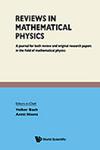Symmetric states for C*-fermi systems
IF 1.3
3区 物理与天体物理
Q2 PHYSICS, MATHEMATICAL
引用次数: 2
Abstract
In the present note, which is the second part of a work concerning the study of the set of the symmetric states, we introduce the extension of the Klein transformation for general Fermi tensor product of two Z graded C-algebras, under the condition that the grading of one of the involved algebras is inner. After extending the construction to C-inductive limits, such a Klein transformation realises a canonical ∗-isomorphism between two Z-graded C-algebras made of the infinite Fermi C-tensor product AF := ( F N B, F N α ) , and the infinite C-tensor product AX := ( X N B, X N α ) of a single Z-graded C-algebra (B, α), both built with respect to the corresponding minimal C-cross norms. It preserves the grading, and its transpose sends even product states of AX in (necessarily even) product states on AF, and therefore induces an isomorphism of simplexes SP(AF) = SP×Z2(AF) ∼ SP×Z2(AX) , which allows to reduce the study of the structure of the symmetric states for C-Fermi systems to the corresponding even symmetric states on the usual infinite C-tensor product. Other relevant properties of symmetric states on the Fermi algebra will be proved without the use of the Klein transformation. We end with an example for which such a Klein transformation is not implementable, simply because the Fermi tensor product does not generate a usual tensor product. Therefore, in general, the study of the symmetric states on the Fermi algebra cannot be reduced to that of the corresponding symmetric states on the usual infinite tensor product, even if both share many common properties. Mathematics Subject Classification: 46L53, 46L05, 60G09, 46L30, 46N50.C*-费米系统的对称态
本文是关于对称态集研究的第二部分,在其中一个代数的级数为内的条件下,我们引入了两个Z分次C代数的广义费米张量积的Klein变换的推广。在将构造扩展到C-归纳极限之后,这样的克莱因变换实现了由单个Z-分级C-代数(B,α)的无限Fermi C-张量积AF:=(F N B,F Nα)和无限C张量积AX:=(X N B,X Nα)组成的两个Z-分级C代数之间的正则*-同构,这两个代数都是关于相应的最小C-交叉范数建立的。它保留了分级,并且它的转置在AF上的(必然是偶数的)乘积状态中发送AX的偶数乘积状态,因此诱导了单纯形SP(AF)=SP×Z2。费米代数上对称态的其他相关性质将在不使用克莱因变换的情况下得到证明。我们以一个例子结束,对于这个例子,这样的克莱因变换是不可实现的,仅仅是因为费米张量积不会生成通常的张量积。因此,一般来说,对费米代数上对称态的研究不能简化为对通常的无限张量积上相应对称态的学习,即使两者都有许多共同的性质。数学科目分类:46L53、46L05、60G09、46L30、46N50。
本文章由计算机程序翻译,如有差异,请以英文原文为准。
求助全文
约1分钟内获得全文
求助全文
来源期刊

Reviews in Mathematical Physics
物理-物理:数学物理
CiteScore
3.00
自引率
0.00%
发文量
44
审稿时长
>12 weeks
期刊介绍:
Reviews in Mathematical Physics fills the need for a review journal in the field, but also accepts original research papers of high quality. The review papers - introductory and survey papers - are of relevance not only to mathematical physicists, but also to mathematicians and theoretical physicists interested in interdisciplinary topics. Original research papers are not subject to page limitations provided they are of importance to this readership. It is desirable that such papers have an expository part understandable to a wider readership than experts. Papers with the character of a scientific letter are usually not suitable for RMP.
 求助内容:
求助内容: 应助结果提醒方式:
应助结果提醒方式:


